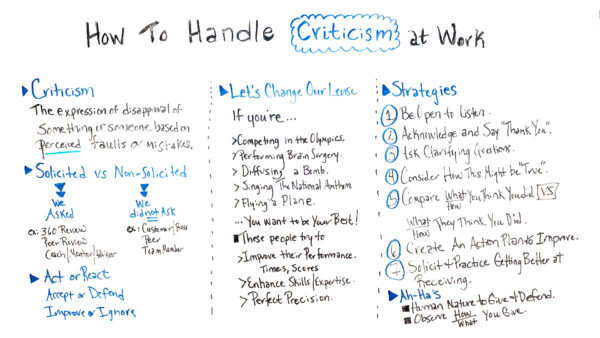Criticism can be helpful, but even when it’s constructive, it can be hard to take—especially at work. How do you deal with criticism productively?

In Review – How to Handle Criticism at Work
What is criticism? Criticism is an expression of disapproval of something or someone based on perceived faults or mistakes. In other words, it’s not infallible.
Types of Criticism
Criticism can be delivered in two ways: solicited and non-solicited. The obvious difference being the former is asked for, and the latter is not. Asking for criticism at work can be structured in a 360 review, a performance review, or by seeking feedback from coworkers in a peer review. You could also look outside your team and ask a coach, mentor or adviser.
Non-solicited criticism can come in many forms, too. It might be a customer or a bad boss. There could be criticism from a team member or other peer. Truly, anyone that you interface with at work, whether in person or via collaboration software, is potentially able to deliver non-solicited criticism.
Regardless of where the criticism is coming from, whether you asked for it or not, the choice of how to handle that criticism is yours. Do you accept the criticism or defend yourself? Can it be used to improve your performance, or do you ignore it?
Criticism is Ultimately About Improvement
If you were, say, competing in the Olympics, or performing surgery, or diffusing a bomb, or flying a plane, wouldn’t you want to be doing that at your best level?
Professionals in any discipline are always trying to improve their performance, enhance their skills and work towards better precision in all that they do. Perfection can never be achieved but should always be sought. So, how can you use criticism to better yourself and your work?
Strategies for Using Criticism to Help You Improve
- Listen: It’s easy to be dismissive; it’s hard to listen with an open mind and pick the truth out of what could be an emotional response.
- Acknowledge: Most criticism isn’t meant to be hurtful, even if it’s not tactful. Therefore, be respectful and thank the person for their input.
- Ask: Repeat back the criticism to make sure you heard it right; then ask questions to clarify what they meant.
- Consider: Maybe what they’re saying is true. This is a consideration that must run through your mind. If you don’t give the criticism the due diligence, then you’re never going to know when the criticism hits home.
- Compare: This is where you can offer a counter-argument. Explain your point of view, what you think you did, without anger or defensiveness. It will help you understand their point of view and gauge its accuracy.
- Create: If you’ve determined that the criticism is valid, the next step is to use it as a springboard to develop an action plan to strategically address the issue and work towards improving your performance.
- Solicit: Now, as you work towards addressing the criticism, keep others in the loop as you practice at getting better, both at the issue and at taking criticism.
Remember: don’t be too hard on yourself. It’s human nature to be critical of others and react defensively when that criticism is directed towards yourself. Use this knowledge as an opportunity to observe how you give criticism and what you criticize, so you’re less hurt and have a more positive impact.
Pro-Tip: One way to help you handle criticism better is by understanding how to give criticism. Criticism can be a creative, not destructive, tool if it’s applied properly. Everyone can be served by learning how to deliver constructive criticism.
The post How to Handle Criticism at Work appeared first on ProjectManager.com.